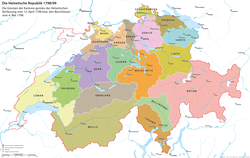Canton of Léman
| Canton of Léman Canton du Léman |
|||||
| Canton of the Helvetic Republic | |||||
|
|||||
| The Helvetic Republic, as at the constitution of 12 April 1798, showing the canton of Léman in yellow, leftmost, to the north and west of Lake Geneva. | |||||
| Capital | Lausanne | ||||
| History | |||||
| • | Independence from Bern | January 24, 1798 | |||
| • | Helvetic Republic proclaimed | April 12, 1798 | |||
| • | Act of Mediation | February 19, 1803 | |||
Léman was the name of a canton of the Helvetic Republic from 1798 to 1803, corresponding to the territory of modern Vaud. As a former subject territory of Bern, Vaud had been independent for only four months in 1798 as the Lemanic Republic before it was incorporated in the centralist Helvetic Republic. Léman comprised all of the Vaud detached from Bernese occupation, apart from the Avenches and the Payerne which, after 16 October 1802, were annexed by the canton of Fribourg until the Napoleonic Act of Mediation the following year, when they were restored to the newly established and newly sovereign canton of Vaud.
The capital of the canton was Lausanne, with the préfet’s residence, the administrative chamber and the judicial tribunal. The canton was divided into 17 administrative districts, each with a sous-préfet. Léman was also one of the five cantons — purely administrative subdivisions — of the Rhodanic Republic planned in March 1798 by the French general Guillaume Brune.
Much of the region that would become the Canton of Léman was conquered in 1538 by Bern and had been jointly administered by Bern and Fribourg for the following two and a half centuries. As the doctrines of the French Revolution spread, they found a warm reception from the citizens of the French-speaking towns around Lake Geneva (French: Lac Léman) which was known as Pays de Vaud. Following the outbreak of the French Revolution of 1789, Frédéric-César de La Harpe (at that time the tutor to the children of Tsar Paul I of the Russian Empire) began to plot a Vaudois uprising from St. Petersburg. LaHarpe was a republican idealist, seeing the rule of the Bernese administration as oligarchical, and as an infringement on the natural rightsof the people of Vaud and the other subject states, such as Fribourg. In 1794 he returned to Switzerland and thence to Paris, where he and other exiles sought French assistance for releasing Vaud and Fribourg from Bern's domination.
...
Wikipedia

